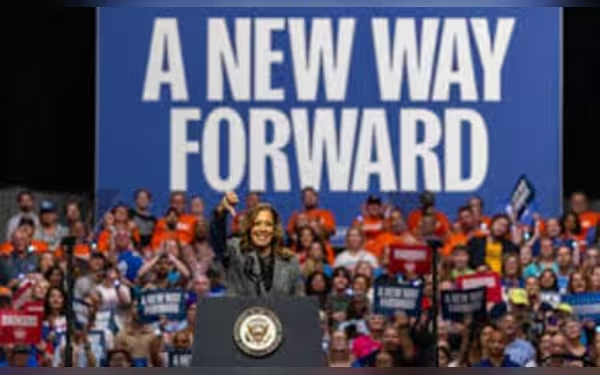Saturday, November 16, 2024 05:47 PM
Kamala Harris Faces Misogyny in Political Landscape
- Kamala Harris endures misogynistic scrutiny in politics.
- Historical bias against women in leadership roles persists.
- Society must celebrate women's achievements without personal attacks.
 Image Credits: thefrontierpost
Image Credits: thefrontierpostKamala Harris faces misogynistic attacks, reflecting a historical bias against women in leadership roles.
In recent times, the political landscape has witnessed a troubling trend where accomplished women, such as Kamala Harris, face undue scrutiny and misogynistic attacks. This phenomenon is not new; it has been a recurring theme throughout history, where the achievements of women in public life are often overshadowed by derogatory remarks about their personal lives. The latest instance involves Laura Loomer, a supporter of Donald Trump, who has made unfounded claims suggesting that Harris used her sexuality to climb the political ladder. Such comments are not only disrespectful but also reflect a broader societal issue that continues to plague women in leadership roles.
Kamala Harris, now 59 and happily married, has had her past relationships, particularly with Willie Brown, the former mayor of San Francisco, brought into the spotlight. This scrutiny is reminiscent of how women like Hillary Clinton have been treated, where their personal lives are dissected and used against them, regardless of their professional accomplishments. The narrative often shifts from celebrating a woman’s success to insinuating that it was achieved through questionable means, a tactic that has been employed against women for decades.
Historically, this pattern of misogyny can be traced back to figures like Pamela Harriman, a prominent Democrat in the 1980s and 90s. Despite her significant contributions to politics and her role in helping many politicians succeed, she was often reduced to derogatory terms, highlighting the persistent bias against women in power. Even Virginia Hall, a World War II spy who played a crucial role in the liberation of Paris, faced discrimination due to her gender and disability, ultimately leading to her being overlooked for a diplomatic position.
Moreover, Clementine Churchill, wife of Winston Churchill, also suffered from a lack of recognition for her contributions. While her husband is celebrated as a historical figure, her vital role in supporting him during the war has often been ignored. This pattern of sidelining women’s contributions is not just a historical issue; it continues to resonate today, as seen in the treatment of Kamala Harris.
As we reflect on these narratives, it becomes clear that there is a pressing need for society to recognize and celebrate the achievements of women without resorting to personal attacks. It is essential for all of us to strive to be 'historians of understanding,' taking the time to research and appreciate the complexities of women's roles in history and politics. By doing so, we can foster a more inclusive environment that values contributions based on merit rather than gender. The fight against misogyny in politics is ongoing, and it is our collective responsibility to challenge these outdated narratives and support women in their pursuit of leadership.













